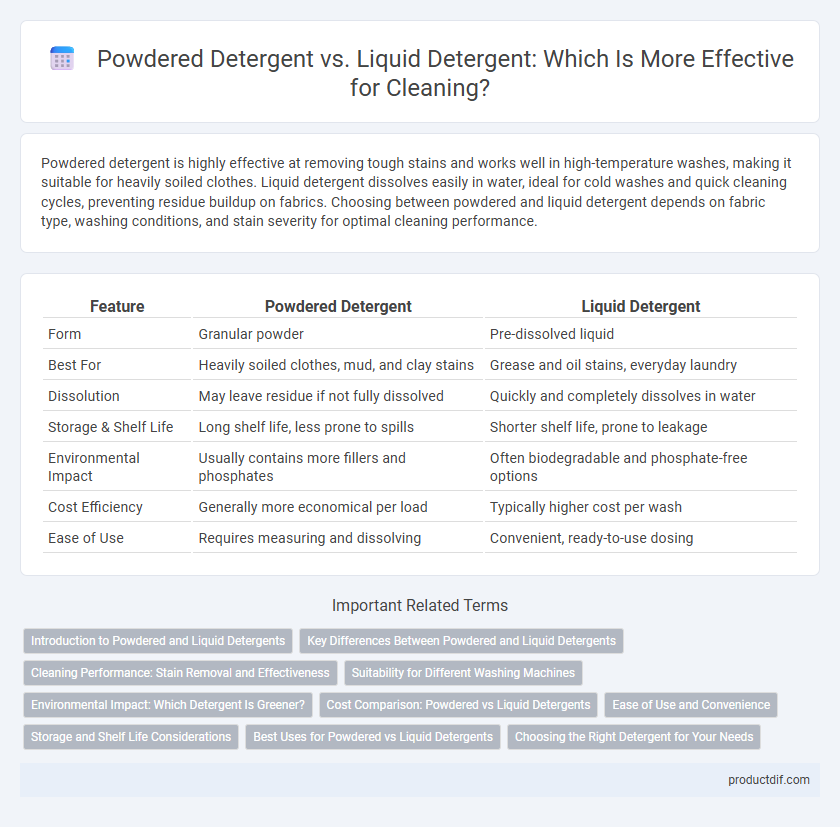Powdered detergent is highly effective at removing tough stains and works well in high-temperature washes, making it suitable for heavily soiled clothes. Liquid detergent dissolves easily in water, ideal for cold washes and quick cleaning cycles, preventing residue buildup on fabrics. Choosing between powdered and liquid detergent depends on fabric type, washing conditions, and stain severity for optimal cleaning performance.
Table of Comparison
| Feature | Powdered Detergent | Liquid Detergent |
|---|---|---|
| Form | Granular powder | Pre-dissolved liquid |
| Best For | Heavily soiled clothes, mud, and clay stains | Grease and oil stains, everyday laundry |
| Dissolution | May leave residue if not fully dissolved | Quickly and completely dissolves in water |
| Storage & Shelf Life | Long shelf life, less prone to spills | Shorter shelf life, prone to leakage |
| Environmental Impact | Usually contains more fillers and phosphates | Often biodegradable and phosphate-free options |
| Cost Efficiency | Generally more economical per load | Typically higher cost per wash |
| Ease of Use | Requires measuring and dissolving | Convenient, ready-to-use dosing |
Introduction to Powdered and Liquid Detergents
Powdered detergents typically contain surfactants, builders, and enzymes in a dry granular form, offering strong cleaning power for removing ground-in dirt and tough stains. Liquid detergents are formulated with concentrated surfactants dissolved in water, providing excellent grease removal and dissolving quickly in both hot and cold water. Both types are designed for different washing needs, with powdered detergents favored for heavy soil and liquid detergents preferred for convenience and versatility.
Key Differences Between Powdered and Liquid Detergents
Powdered detergents excel in removing outdoor stains and are more cost-effective, containing ingredients like enzymes and surfactants optimized for dirt and clay. Liquid detergents dissolve quickly in cold water, making them ideal for pre-treating stains and washing delicate fabrics. The choice between powdered and liquid detergents depends on washing machine type, water temperature, and specific laundry needs.
Cleaning Performance: Stain Removal and Effectiveness
Powdered detergent excels at removing ground-in dirt and clay stains due to its high alkalinity and abrasive agents, making it highly effective for tough, outdoor stains. Liquid detergent dissolves quickly in water, targeting greasy and oily stains with enzymes that break down proteins and fats more efficiently than powder. Both forms offer strong cleaning performance, but liquid detergents typically perform better on fresh stains while powders provide superior results on heavy soil and discoloration.
Suitability for Different Washing Machines
Powdered detergent is ideal for use in high-efficiency front-loading washing machines due to its low-sudsing formula, which helps prevent residue buildup and ensures optimal cleaning performance. Liquid detergent is better suited for top-loading washing machines with agitators because it dissolves quickly in water and can penetrate fabrics more effectively during the wash cycle. Consumers should always check the washing machine manufacturer's recommendations to choose the appropriate detergent type for their specific model.
Environmental Impact: Which Detergent Is Greener?
Powdered detergents generally have a lower environmental impact due to their concentrated formulas, reduced packaging waste, and lower water content during production and transportation. Liquid detergents often contain higher levels of chemicals and require plastic bottles, contributing to increased carbon emissions and plastic pollution. Choosing powdered detergent helps minimize energy consumption and plastic waste, making it a greener option for eco-conscious consumers.
Cost Comparison: Powdered vs Liquid Detergents
Powdered detergents generally offer a lower cost per load compared to liquid detergents, making them a more budget-friendly option for households seeking value. Liquid detergents, while often priced higher, provide convenience and ease of use, which can justify the additional expense for some consumers. The pricing difference is influenced by factors such as formulation, packaging, and concentration, with powdered detergents typically being more cost-effective in bulk purchases.
Ease of Use and Convenience
Powdered detergent requires measuring and can leave residue if not fully dissolved, making it less convenient for quick laundry tasks. Liquid detergent dissolves easily in all water temperatures and can be pre-measured with cap dispensers, enhancing ease of use. The liquid form also allows for direct application on stains, offering targeted cleaning with minimal effort.
Storage and Shelf Life Considerations
Powdered detergents generally have a longer shelf life, typically lasting up to two years when stored in a cool, dry place away from moisture, which preserves their cleaning efficacy. Liquid detergents, while convenient for use, often have a shorter shelf life of around 6 to 12 months and must be stored in tightly sealed containers to prevent water contamination and degradation. Proper storage conditions for both types of detergents are crucial to maintain their stability and performance over time.
Best Uses for Powdered vs Liquid Detergents
Powdered detergents excel at removing tough stains and mud due to their high alkalinity and strong stain-fighting enzymes, making them ideal for heavily soiled, durable fabrics like cotton and outdoor gear. Liquid detergents dissolve quickly in cold water and are effective for treating greasy or oily stains, making them suitable for delicate fabrics, colored clothing, and pre-treating spots. Choosing between powdered and liquid detergents depends on fabric type, stain severity, and washing temperature to optimize cleaning performance and fabric care.
Choosing the Right Detergent for Your Needs
Powdered detergent excels in removing tough stains and is often more cost-effective for heavy-duty laundry loads, making it ideal for households dealing with dirt and grime. Liquid detergent dissolves quickly, works well in cold water, and is better suited for pre-treating stains and handling delicate fabrics. Choosing the right detergent depends on water type, fabric sensitivity, stain severity, and washing machine compatibility to ensure optimal cleaning performance.
Powdered detergent vs Liquid detergent Infographic

 productdif.com
productdif.com